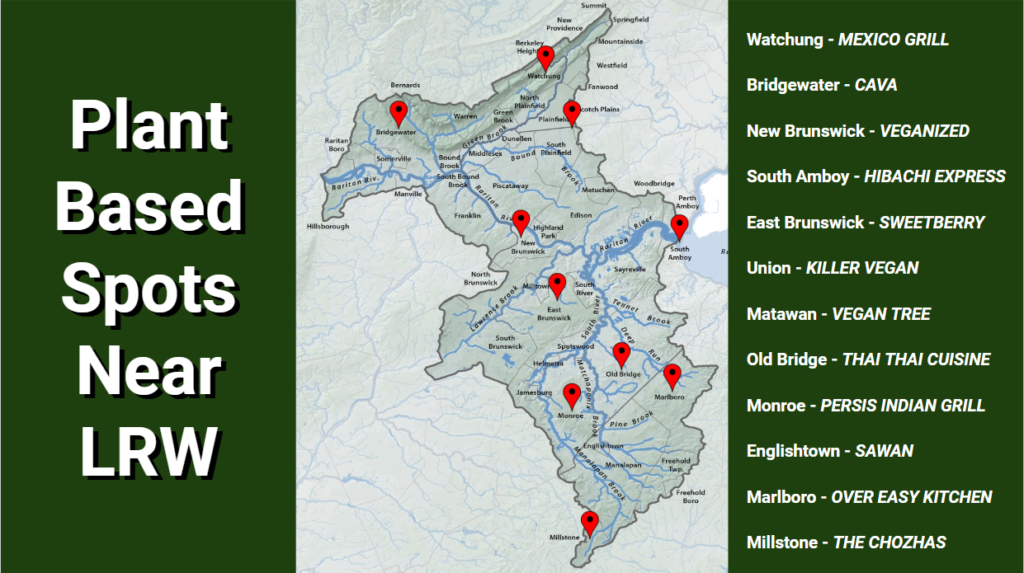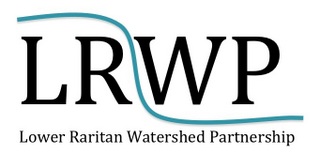World Vegan Day in the Lower Raritan: The Greener Grass on the Other Side
Article by Angely Melendez, written as part of the Rutgers Spring Semester 2020 Environmental Communications course
November 1, 2020 is World Vegan Day. Want to celebrate? See below for a listing of the many vegan and vegetarian restaurants in the Lower Raritan Watershed to choose from!
Plant Based Restaurants in the Lower Raritan Watershed

| Watchung | Mexico Grill | https://www.mexicogrillnj.com/ |
| Bridgewater | Cava | https://order.cava.com/stores/70/menu |
| New Brunswick | Veganized | http://veganizedfoods.com/ |
| South Amboy | Hibachi Express | https://www.hibachiexpressandsushi.com/ |
| East Brunswick | Sweetberry | https://www.sweetberrybowls.com/eastbrunswick |
| Union | Killer Vegan | https://killervegan.com/ |
| Matawan | Vegan Tree | https://www.vegantreematawan.com/ |
| Old Bridge | Thai Thai Cuisine | http://thaithaistirling.com/ |
| Monroe | Persis Indian Grill | http://persismonroe.com/menu/ |
| Englishtown | Sawan | https://www.sawanmarlboronj.com/#menu |
| Marlboro | Over Easy Kitchen | https://www.overeasykitchen.com/ |
| Millstone | The Chozhas | https://thechozhas.com/ |
Reasons to go Vegan or Vegetarian
Ask someone just 20 years ago if they’d go vegetarian or vegan and they’d say no, you’re crazy. Meat has always been a staple within American cuisine and continues to be so, but even in the last 3 years there has been a 600% increase in Americans who consider themselves vegan. A staggering percentage, to say the least, but although those numbers are great, that’s still only 6% of American consumers in 2017 (“Veganism is at an All-Time High: Is it A Fleeting Fad or The New Norm?” 2018).
For the meat eaters out there that are still unsure of what the excitement is all about, I want to introduce World Vegan Day. This day visits us every November 1, and introduces the idea of the ever so popular diets: vegetarianism and veganism. Maybe the possibility of seeing what the hub-bub is all about intrigues you, and if that’s the case, then this is the day for you. See the map above for a route around the Lower Raritan River with stops all along it at plant based restaurants or others that feature plant based options.
So, what can these diets offer you? A slew of things, actually. One of the big factors to go plant-based is due to health. According to Harvard Medical School, a vegetarian diet offers some wonderful benefits and takes out some of the harmful negatives, “… As a result, [making them] likely to have lower total and LDL (bad) cholesterol, lower blood pressure, and lower body mass index (BMI), all of which are associated with longevity and a reduced risk for many chronic diseases.”
Besides personal gains, you’d also be doing the Earth (and our Lower Raritan Watershed) a huge solid. A big sign of inefficiency within agriculture lies within the raising of animals for their meat. About 70% of grain and cereals grown in the U.S. are fed to farm animals. Keeping that in mind, 16lbs of grain goes into producing 1lb of meat. And since demand for meat is so high, these farms continue to expand, knocking down natural ecosystems for the production of corn. Instead of using all those resources and high amounts of energy to produce that little amount of consumable meat, it could instead be used for humans.
So, come out to the Lower Raritan River during World Vegan Day, check out what local vegan and vegetarian restaurants have on offer, and learn why the grass is greener on the other side!
Effective communication about the environment is critical to raising awareness and influencing the public’s response and concern about the environment. The course Environmental Communication (11:374:325), taught by Dr. Mary Nucci of the Department of Human Ecology at Rutgers University, focuses on improving student’s writing and speaking skills while introducing students to using communication as a tool for environmental change. Students not only spend time in class being exposed to content about environmental communication, but also meet with communicators from a range of local environmental organizations to understand the issues they face in communicating about the environment. In 2019 and 2020, the course applied their knowledge to creating blogs for their “client,” the Lower Raritan Watershed Partnership (LRWP). Under the guidance of LRWP Founder, Dr. Heather Fenyk, students in the course researched topics about water quality and recreation along the Raritan. Throughout 2020 the LRWP will share student work on our website.
